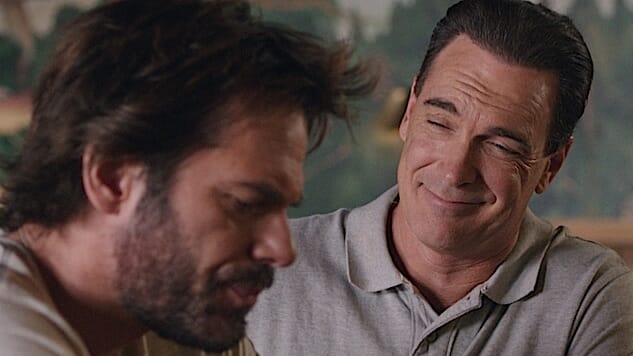Divine Access

Divine Access, Steven Chester Prince’s quasi-theological indie, comes along at an interesting moment in American culture—a moment of intense sociopolitical polarity; a moment of authoritarian bombast, religious zealotry and prurient excess; and a moment where the boundaries between lives private and public have corroded almost entirely. A lightly satirical dramedy that follows Zen master Jack Harriman (played by the perfectly cast Billy Burke) as he becomes a hot ticket on the speaking tour circuit of the Deep South, Divine Access captures this moment with a fine touch. Prince’s film exhibits an understanding of the zeitgeist and the peculiar crystallization of ideas and trends that make this time in 21st century America so disquieting for so many.
Burke’s Jack, whose mornings are marked by coffee on his porch and skinny-dips in the lake below it, is your archetypal easy-going dude, clad in boot-cut jeans and trucker hats, waxing philosophical in vague platitudes; his personal doctrine for life is defined by a sort of relativism, a chill openness, a penchant for living in the “now.” His friend, Bob, played with classic drollery by Patrick Warburton, invites him to appear on Divine Access, a public access television show hosted by the Reverend Guy Roy Davis, who Bob is looking to fire. When Jack appears on the show and debunks the Christ-revering Reverend’s ideas, he becomes a celebrity of sorts, earning the ire of the man he embarrassed and the adoration of viewers—a record four of them call into the show when Jack becomes its host, which Bob notes is four more callers than the show’s ever received.
With throngs of eager disciples mobilizing in support, Jack embarks on a speaking tour with Nigel (Joel David Moore), the cinematic lovechild of Kenneth Parcell and Napoleon Dynamite, who documents Jack’s teachings like a scrivener. Once Jack and Nigel start the tour, the film becomes a unique take on the road trip picture, as Jack enjoys one-night stands in motels with his more impish female converts, who are less keen on his fatuous existentialist rigmarole than his good looks and his celebrity. The too heavy-handed question probed throughout the film is this: does Jack even believe half the shit he’s saying, and does he take responsibility for indoctrinating his loyalists with his unflappable anything-goes dogma? It’s hard to tell just how earnest he is, since he seems equally sincere sermonizing to fans and bringing girls back to his room afterwards. But the better question is why the film buys into Jack’s philosophy, lionizing its protagonist in much the same way his henchmen do? Jack is not a demagogue like The Master’s Lancaster Dodd, nor is he a fanatical nut, but Divine Access, written by Prince, John O’Connell and Michael Zagst, seems to think there’s a lot more to what he’s saying than there actually is.
-

-

-

-

-

-

-

-

-

-

-

-

-

-

-

-

-

-

-

-

-

-

-

-

-

-

-

-

-

-

-

-

-

-

-

-

-

-

-

-








































